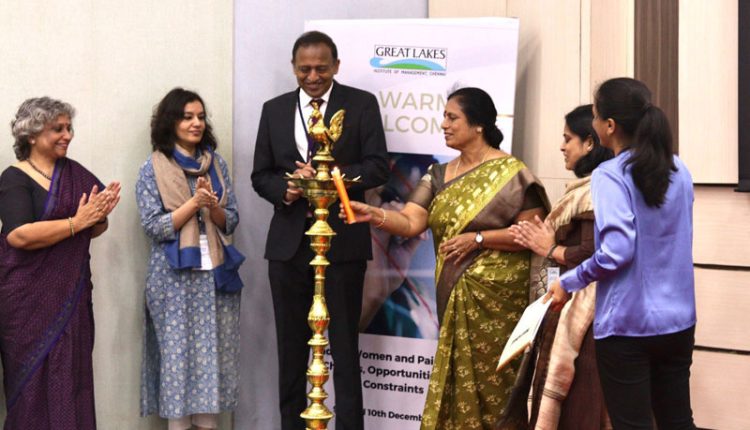The women-oriented seminar discussed ways to bring about change to lower barriers to Indian women’s effective participation in the labour market
Chennai,: Great Lakes Institute of Management, true to its tagline of ‘Global mindset, Indian roots’ organised a conference – Indian Women and Paid Work, choices, opportunities and constraints on December 9th and 10th in their Chennai premises.
Helmed by Vidya Mahambare of Great Lakes Institute of Management, Chennai and Sowmya Dhanaraj of Good Business Lab, the event saw the participation of 100 people in both modes (direct and online) in spite of rough weather.The conference deliberated on the constraints which stop women from developing their full economic potential and discussed ways to bring about change to lower barriers to Indian women’s effective participation in the labour market. Participants were allowed to attend the conference in both direct and online modes, by paying a nominal fee.
The first day of the conference started off with an inaugural speech by K Santhakumari, regional vice-president of the International Federation of Women Lawyers and the former president of the All-India Federation of Women Lawyers.
She shared her inspiring journey to drive home the point that it is important for women to give themselves a chance. Her hilarious and sharp speech focused on the importance of equality and social justice.
While thanking the chief guest for her insightful and inspiring speech, Professor Suresh Ramanathan, Dean and principal, Great Lakes Institute of Management, Chennai highlighted the steps taken by the institution to empower women. He said they have a Centre for Women Leadership and said “We do our best to support women to get back to office after a break,”. He announced that the institution would be giving the system of paternity leave from now on.
Secondly, Farzana Afridi of Indian Statistical Institute (Delhi) and National University of Singapore spoke about the networks, gender norms and women’s labour supply: Experimental evidence using a job search platform, in the keynote lecture.
This was followed by a session on job search to climb up the ladder which was chaired by Divya Pandey of International Initiative for Impact Evaluation. Srinivasan Murali of Indian Institute of Management, Bangalore; Anant Ahuja of Good Business Lab and Shahi Exports; J V Meenakshi of Delhi School of Economics; Sangeeta Bansal of Jawaharlal Nehru University and Brinda Viswanathan, Madras School of Economics presented papers which was followed by open discussion.
Ashwini Deshpande, Ashoka University and Institute of Labour Economics, (Bonn), spoke about the structural change and the decline in female labour force participation in India. She focussed on how illiterate and highly educated women are employable and are employed but the women who fall in the middle with 8, 10th or 12th standards as qualification fall out of the labour market.
A session in Gender, Health and Crime was chaired by Shreya Biswas of Birla Institute of Technology and Science, Pilani, Hyderabad. Anuja Jayaraman, Society for Nutrition, Education and Health Action and Aditi Bhowmick, Data development Lab, University of Yale presented papers related to this topic.
The second day of the conference started off with a session on social norms and paid work chaired by Brinda Viswanathan, Madras School of Economics, Chennai. Rosa Abraham of Azim Premji University; Nishant Anjum of Jawaharlal Nehru University, Delhi; Rahul Lahoti of UNU-WIDER, Helseinki; Hema Swaminathan of Indian Institute of Management, Bangalore; Madhulika Khanna of Amazon and Divya Pandey of International Initiative for Impact Evaluation participated. Purna Banerjee of Reserve Bank of India and Shreya Biswas of
Birla Institute of Technology & Sciences, Pilani and DebojyotiMazumder of Reserve Bank of India presented papers on related topics.
The session on empowering women was chaired by Srinivasan Murali of Indian Institute of Management, Bangalore. Maya Vengurlekar of Crisil Foundation; Rukmini S, an independent data journalist and Kalpana K of Indian Institute of Technology, Madras presented papers on related topics.
A panel discussion on corporate and academic workplaces on what role does the gender play? – was moderated by Pratima Lakshamanan of Great Lakes Institute of Management. K Rajeswari, Area- Chair of Marketing, Great Lakes Institute of Management, Chennai; Vandhana Sundaram, diversity and inclusion, LTIMindtree and PonMythili of Great Lakes Institute of Management participated in the panel discussion.
The discussion revolved around perceived notions when it comes to assessing skills possessed by a woman, gender bias and occupation segregation, among others. The panel discussed about how flexibility in working hours will bring back more women into the workforce. The impact of technology has changed the scene for the better, agreed the panellists. The focus was also on ‘continuing the conversation’ for women to go on in their journey and succeed.
The session on social norms and paid work – II was moderated by Rosa Abraham of Azim Premji University. Diva Dhar, University of Oxford; Sowmya Dhanaraj, Good Business Lab and Madras School of Economics, Vidya Mahambare, PonMythili and Booshanam of Great Lakes Institute of Management, Chennai presented papers in related topics.
The last keynote lecture was on the topic – How did East Asia overtake South Asia on gender? – which was presented by Alice Evans, King’s College, London and faculty associate at Harvard, CID. Alice proved her point wonderfully by taking the examples of Bangalesh& Taiwan about how they are doing well when it comes to helping their women progress. She explained that migrating to new cities is helping women explore new opportunities and possibilities.
The conference closed with the remarks by Vidya Mahambare of Great Lakes Institute of Management, Chennai and Sowmya Dhanaraj of Good Business Lab.

